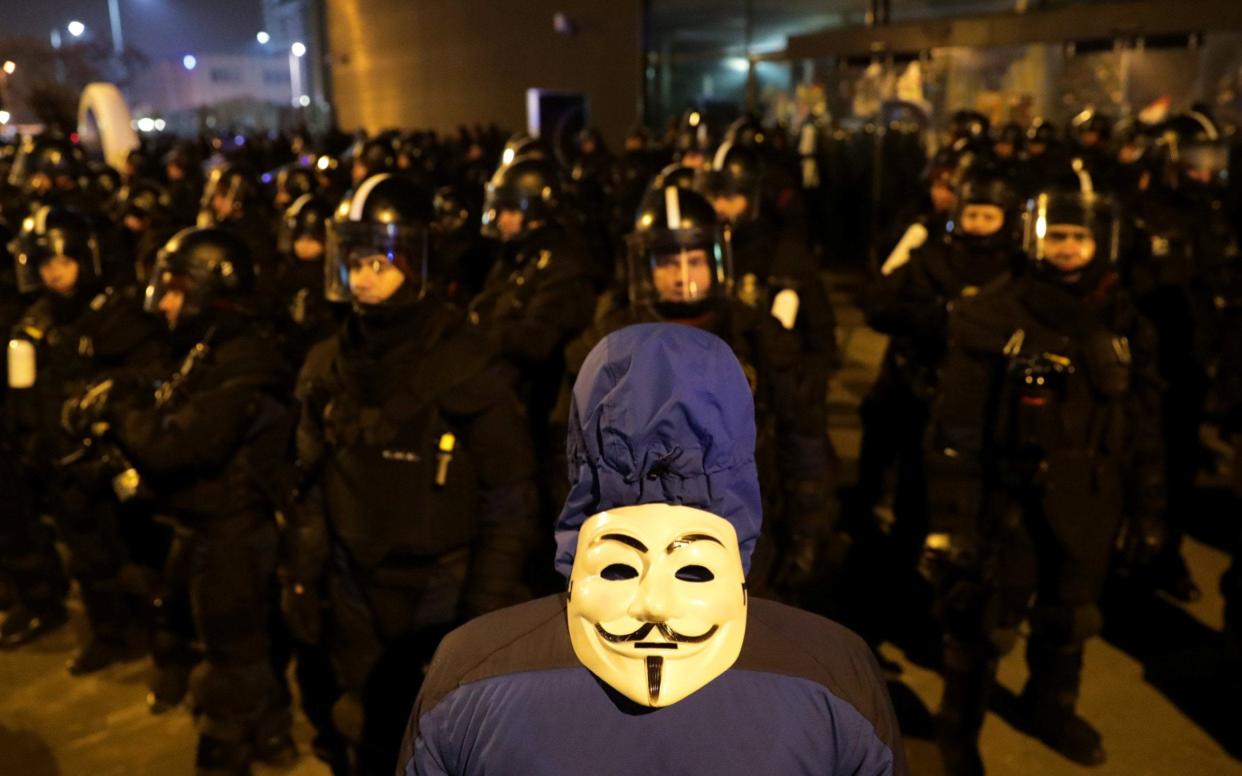Challenge to Hungary's strongman Viktor Orban as 'slave law' protests rock Budapest

Viktor Orban, the populist prime minister of Hungary, is facing a rare challenge to his grip on power as protesters demand an end to controversial labour reforms and and what they call his assault on democracy.
The Hungarian capital has been rocked by nearly daily protests and opposition MPs have called for Mr Orban's overthrow since the country's parliament adopted a bill liberalising overtime rules on Wednesday.
As part of the reform, which critics have dubbed "the slave law", employers would be allowed to delay payment for overtime worked for up to three years.
Several thousand people gathered outside the offices of Hungary’s state television broadcaster on the fifth night of protests on Monday evening, after two opposition MPs were physically thrown out of the building.
Arkos Hadhazy and Bernadetter Szer were filmed being manhandled out of the MTVA headquarters by security guards earlier in the day, after demanding that the station broadcast a list of protesters' demands.
The pair, among a group of opposition MPs who spent the night inside the building demanding studio access, called a protest for Monday evening in response under the slogan: "They threw us out the door, but we'll go back in through the windows."
“We knew this was no longer a democracy, but we did not know it was already a dictatorship,” Ms Szer said after filing a complaint with police outside the building on Monday morning. She said the security guards had violated the MPs' constitutional right to airtime and free access to the building.

The demonstrations peaked on Sunday night, when up to 15,000 people chanting "we want democracy" and "we want free media" gathered outside parliament.
Half a dozen opposition MPs including Mr Hadhazy and Ms Szer then led several thousand demonstrators on a march from parliament to the offices of MTVA, the state broadcaster, to demand they broadcast the list of demands.
Some members of the crowd threw smoke bombs and paint when the station refused to broadcast the list. Riot police responded with tear gas.
The demands including the repeal of both the labour law and a controversial judicial reform that was passed on the same day, which paves the way for new "administrative courts" to oversee cases concerning matters such as public procurement or electoral disputes.
Opposition leaders say it would grant Mr Orban near total control of the judicial system because Laszlo Trocsanyi, the justice minister and a close ally of the prime minister, would oversee the courts.
They are also demanding a cut in the overtime police officers are required to work, that Hungary sign up to the European Prosecutor's office, a move Mr Orban has rejected, and guarantees of editorial impartiality at the country's state media outlets.
Mr Orban has been accused of destroying editorial independence at MTVA and other influential media outlets, effectively giving his Fidesz party a monopoly on positive media coverage.

The government says the labour reform, which increases the annual overtime that employers can demand from 250 to 400 hours and allows payment to be delayed by up to three years, is needed by employers short of manpower and will benefit those wanting to work extra hours.
Opposition MPs and labour unions have accused Mr Orban of bowing to pressure from German businesses which operate major factories in the country.
The wave of dissent has brought rare unity to Hungary's fractious opposition groups, with liberal and left wing groups siding with right wing parties, including the nationalist Jobbik, to oppose the bill.
Protests have also taken place in other major cities.
"[Government] Power has failed in Budapest. It is still alive because the truth doesn't get to the people in the provinces. I ask you to bring the truth to these people" Peter Marki-Zay, the mayor of Hodmezovasarhely, a town in southeastern Hungary, said in a message to the protesters in Budapest.

